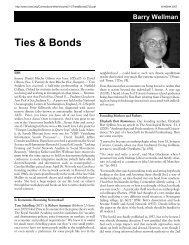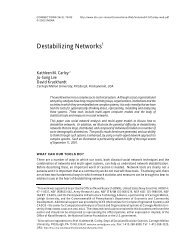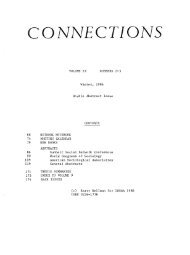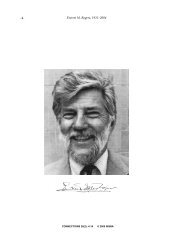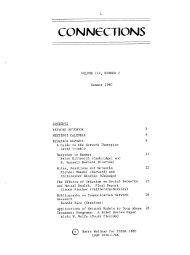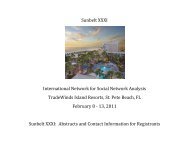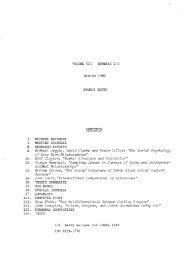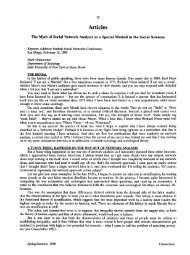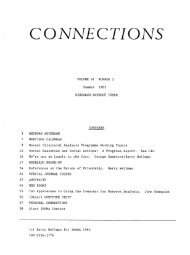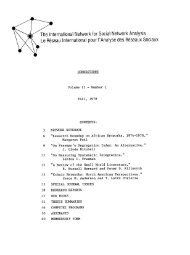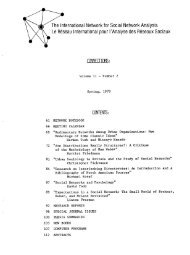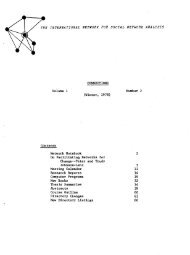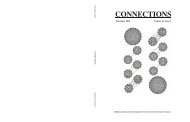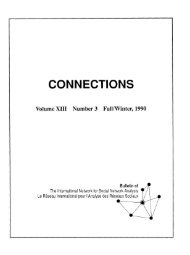Text Analysis of the Social Capital Literature Network ... - INSNA
Text Analysis of the Social Capital Literature Network ... - INSNA
Text Analysis of the Social Capital Literature Network ... - INSNA
Create successful ePaper yourself
Turn your PDF publications into a flip-book with our unique Google optimized e-Paper software.
40 Building a Theory <strong>of</strong> <strong>Social</strong> <strong>Capital</strong> / Lin<br />
<strong>of</strong> outcomes : (1) returns to instrumental action, and (2) return to expressive action (Lin 1992a ;<br />
Lin 1986 ; Lin 1990) . Instrumental action is taken to obtain resources not possessed by <strong>the</strong> actor,<br />
whereas expressive action is taken to maintain resources already possessed by <strong>the</strong> actor .<br />
For instrumental action, we may identify three possible returns : economic return, political<br />
return, and social return . Each return can be seen as added capital . Economic return is<br />
straightforward. Political return is similarly straightforward, represented by hierarchical<br />
positions in a collective . <strong>Social</strong> gain needs some clarification . I have argued that reputation is<br />
an indication <strong>of</strong> social gain . Reputation can be defined as favorable/unfavorable opinions about<br />
an individual in a social network . A critical issue in social exchange where social capital is<br />
transacted is that <strong>the</strong> transaction may be asymmetric : a favor is given by <strong>the</strong> alter to ego . The<br />
ego's action is facilitated, but what is <strong>the</strong> gain for <strong>the</strong> alter, <strong>the</strong> giver <strong>of</strong> <strong>the</strong> favor Unlike<br />
economic exchange, where reciprocal and symmetric transactions are expected in <strong>the</strong> short or<br />
long term, social exchange may not entail such expectation . What is expected is that <strong>the</strong> ego and<br />
<strong>the</strong> alter both acknowledge <strong>the</strong> asymmetric transactions which create <strong>the</strong> former's social debt<br />
to <strong>the</strong> latter, who accrued social credit. <strong>Social</strong> debt must be publicly acknowledged in public<br />
for <strong>the</strong> ego to maintain his/her relationship with <strong>the</strong> alter . Public recognition in <strong>the</strong> network<br />
spreads <strong>the</strong> reputation <strong>of</strong> <strong>the</strong> alter . The greater <strong>the</strong> debt, <strong>the</strong> larger <strong>the</strong> network, and <strong>the</strong> stronger<br />
<strong>the</strong> need for <strong>the</strong> ego and <strong>the</strong> alter to maintain <strong>the</strong> relationship, <strong>the</strong> greater <strong>the</strong> propensity to<br />
spread <strong>the</strong> word in <strong>the</strong> network and, thus, <strong>the</strong> greater <strong>the</strong> reputation gained by <strong>the</strong> alter . In this<br />
process, <strong>the</strong> alter is gratified by <strong>the</strong> reputation, which, along with material resources (such as<br />
wealth) and hierarchical positions (such as power) constitutes one <strong>of</strong> <strong>the</strong> three returns<br />
fundamental in instrumental actions . I have discussed this issue elsewhere (Lin, 1998) .<br />
For expressive action, social capital is a means to consolidate resources and to defend against<br />
possible resource losses (Lin, 1986 ; Lin, 1990) . The principle is to access and mobilize o<strong>the</strong>rs<br />
who share interest and control <strong>of</strong> similar resources so that embedded resources can be pooled<br />
and shared in order to preserve and protect existing resources . In this process, alters are willing<br />
to share <strong>the</strong>ir resources with ego because <strong>the</strong> preservation <strong>of</strong> <strong>the</strong> ego and its resources enhances<br />
and reinforces <strong>the</strong> legitimacy <strong>of</strong> alters' claim to like resources . Three types <strong>of</strong> return may be<br />
specified : physical health, mental health, and life satisfaction . Physical health involves<br />
maintenance <strong>of</strong> physical functional competence and freedom from diseases and injuries . Mental<br />
health reflects capability to withstand stresses and maintenance <strong>of</strong> cognitive and emotional<br />
balance . Life satisfaction indicates optimism and satisfaction with various life domains such<br />
as family, marriage, work, and community and neighborhood environments .<br />
Oftentimes, returns to instrumental actions and expressive actions reinforce each o<strong>the</strong>r . Physical<br />
health <strong>of</strong>fers <strong>the</strong> capacity to handle <strong>the</strong> enduring work load and responsibility needed to attain<br />
economic, political, and social statuses . Likewise, economic, political or social statuses <strong>of</strong>ten<br />
<strong>of</strong>fer resources to maintain physical health (exercises, diet, and health maintenance) . Mental<br />
health and life satisfaction are likewise expected to have reciprocal effects with economic,<br />
political and social gains . However, factors leading to <strong>the</strong> instrumental and expressive returns<br />
are expected to show differential patterns . As mentioned earlier, it may well be that open<br />
networks and relations are more likely to enable access to and use <strong>of</strong> bridges to reach to<br />
resources lacking in one's social circle and to enhance one's chances <strong>of</strong> gaining<br />
resources/instrumental returns . On <strong>the</strong> o<strong>the</strong>r hand, a denser network with more intimate and<br />
reciprocal relations among members may increase <strong>the</strong> likelihood <strong>of</strong> mobilizing o<strong>the</strong>rs with<br />
shared interests and resources to defend and protect existing resources/expressive returns .



